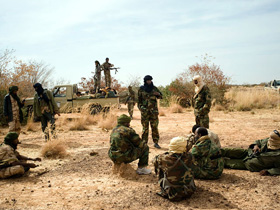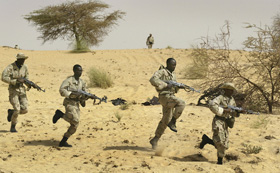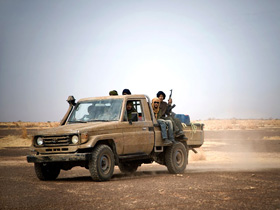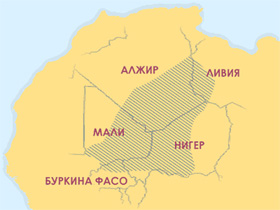Military coup in Mali: reasons and consequences
Tuareg warrior
In
Login if you are already registered
(no votes) |
(0 votes) |
Doctor of Historical Sciences, Leading Researcher at the Institute of Africa of the Russian Academy of Sciences
The Arab Spring and NATO aggression against Libya have triggered irreversible and highly dangerous processes in the Sahara-Sahel region. The Tuareg exodus from Libya has resulted in a military coup in Mali, a separatist war in the country’s northern region, and the creation of the self-proclaimed state of Azawad. There now looms a threat of a large-scale political and military crisis in the region.
The Arab Spring and NATO aggression against Libya have triggered irreversible and highly dangerous processes in the Sahara-Sahel region. The Tuareg exodus from Libya has resulted in a military coup in Mali, a separatist war in the country’s northern region, and the creation of the self-proclaimed state of Azawad. There now looms a threat of a large-scale political and military crisis in the region.
The current conflict in Mali has a long history and can be explained by a variety of reasons. In essence, there are several conflicts involved in the situation, each of its own unique nature, that have dramatically coincided in time.
‘Life Sustenance’ Conflict
In Mali, there coexist various sociolinguistic (often mistakenly identified as ‘ethnic’) communities characterized by different life sustenance cultures. Sedentary farmers and fishermen (tribes speaking the Mande and Songhay languages) which is the majority of the Mali population, live in the south-eastern part of the country. The cattle farmers, speaking the Fulbe language, live in the country’s south-western border regions. In the sands of the Sahara desert live the nomadic Berber-speaking Tuareg tribes, as well as the Arabs and the Moors known in the Sahel region as warriors, merchants, and cattle farmers.
The recent violent cataclysms are the direct consequences of the Arab Spring and NATO aggression against Libya.
Such a varied mix of languages, cultures, and traditions is in itself a potential threat of possible conflicts erupting. The situation is further exacerbated by the fact that historically the Malian people have a very vivid image of the enemy. Throughout the country’s history, farmers have suffered from the nomads’ invasions. The historical memory of the Malian people is therefore a highly conflictogenic factor. At present, the relatively peaceful farmers still suffer from the invasions of the ‘corsairs of the desert’ - the aggressive nomadic tribes of the Tuareg and Moors. The latter still engage in caravan robbery, kidnapping, weapons and drug trade.
Nomads – Mali’s ‘Stepchildren’
Mali’s central governmental authorities are represented primarily by the tribes speaking the Mande and Songhay languages’ dialects, and partially – the Fulbe language. The government largely ignores the nomads’ vital interests. The state financing practically never reaches the northern territories; the benefits of the country’s social programs (meager as they are) and the western countries’ humanitarian aid is not allocated to the tribes of the Tuareg, Moors, and Arabs. The difficult situation is escalated to the level of armed rebellions in years of severe droughts, when massive loss of cattle dooms the nomads to starvation. The central government’s response to the problem consists in sending military expeditions to the country’s northern regions.
However, Mali is a very poor country; its army consists of only about 5 thousand poorly-armed soldiers and officers. They are simply incapable of controlling the vast territories of the Sahara-Sahel region. Therefore, throughout almost the entire postcolonial period, Mali’s central government has been making repeated attempts to reach agreements with the Tuareg and even enlist their sympathies. But the meager state budget, in combination with widespread corruption, did not allow satisfying the demands of the headstrong nomads, and the short periods of conflict-free coexistence invariably gave way to further armed confrontations.
End of Jamahiriya and the Tuareg Exodus from Libya
The recent violent cataclysms are the direct consequences of the Arab Spring and NATO aggression against Libya. It is a known fact that Muammar Gaddafi had plans for forming special military units consisting of the Tuaregs supporting the idea of establishing a unified state. Gaddafi saw the mythical Azawad as a step towards creating the ‘Big Sahara’ federation. According to the Jamahiriya leader’s vision, the federation was to include and unite the territories of Niger, Mali, Burkina-Faso, and Algeria. In the early 70s, the Islamic Legion was created in Libya. In 1980, Gaddafi suggested that Libya’s Tuaregs should undergo training at military camps, and in 2005 he granted unlimited resident status to all Nigerian and Malian Tuaregs living on Libya’s territory. In 2006, he called on all the tribes of the Sahara region to form a unified force to combat terrorism and illegal drug trafficking. Most of the Tuaregs remained loyal to Gaddafi. Immediately following the onset of the war, the chiefs of tribes from Libya, Mali, and Niger declared their readiness and willingness to fight on the Colonel Gaddafi’s side against the ‘traitors that betrayed Libya’. The Tuaregs in Mali declared that they would wage a war against the government of Mali if it showed support to the ‘rats’, or if any of Gaddafi’s supporters got arrested in Mali.
After the defeat of Gaddafi’s supporters, the situation in the north of Mali was highly volatile; the Tuareg began returning to their original regions of residence. They returned to Mali with the state-of-the-art French weapons, which had previously been dropped from NATO planes by the Libyan rebels in the west of Libya. The rebel groups proclaimed the establishment of the National Movement for the Liberation of Azawad (MNLA).
On January 17 2012, a full-scale war broke out in the northern part of Mali. The military garrisons forces – few in numbers and completely demoralized – were unable to stand against the Tuaregs and surrendered practically without fighting. In two months, the Tuaregs conquered two thirds of the country’s territory and declared the independence and sovereignty of the self-proclaimed state.
Uranium and Al Qaeda’s appearance in Sahel
Mali has been considered a reserve base for Al Qaeda since the American intervention in Afghanistan.
This conflict derives its distinctive tone from the fact that Sahel possesses very rich deposits of uranium that are already being developed by French and Chinese companies. Expert data show that uranium resources in Mali are estimated at 100,000 metric tons of U308 with an average content of uranium in ores of 0.085%. There is reason to believe that the Tuareg tribes’ leaders don’t want to miss out on the fantastic profit to be obtained from trading this strategic material. And that this can to a great extent explain their military actions of late.
If the Tuaregs or Islamites gain control over uranium mines, they will immediately start looking for ways to sell unenriched uranium to rogue nations, first and foremost, Iran.
Moreover, Al Qaeda in the Islamic Maghreb (AQIM) is also actively bringing in uranium deposits. Mali has been considered a reserve base for Al Qaeda since the American intervention in Afghanistan. There are several reasons, in addition to its uranium, for Al Qaeda to be interested in Mali: the proximity of potential terrorist targets in Europe, the inaccessibility of the northern regions of Mali, and the tense relations between the Malian government and the Tuaregs. There are also other Islamic organizations operating in the region, such as the Salafist Group for Call and Combat (GSPC) This extremist organization, founded by Emir Hassan Hattab in 1996 in Algeria, has already been partially absorbed by the AQIM. A different part of the Salafi movement served as the basis of yet another Islamic organization: Ansar Dine, the latter consists mainly of the Tuaregs, with Arabs, Moors, Tuaregs, Pakistanis, Pashtuns, etc., all fighting under the banner of AQIM. The National Liberation Front of Azawad (FNLA) plays off of the opposition between the Arabs and the Tuareg, and is in opposition to the National Movement for the Libertation of Azawad. It is also important to remember that the Tuareg community itself is not homogenous. Individual tribes and their leaders are constantly at war with one another, pursuing their own largely mercenary interests, influenced by radical Islam to varying degrees. There is definitely not any unity within the self-proclaimed Azawad, and there never will be.
The uranium riches of Sahel are both attractive to the economically developed countries of the West and China, on the one hand, and are perceived by those same countries as a potential threat, on the other. The USA is concerned about the accessibility of this dangerous material to Islamic fundamentalists. If the Tuaregs or Islamites gain control over uranium mines, they will immediately start looking for ways to sell unenriched uranium to rogue nations, first and foremost, Iran. The latter has already purchased thousands of centrifuges for enriching uranium. If Azawad becomes a political reality, then without a doubt, AQIM will begin enriching uranium independently. Such a course of events could not possibly be fixed by the USA or its NATO allies.
“Mini Coup” in Bamako
A mini coup in Bamako unfolded amid the combat with the Tuaregs. The army supposedly accused President Amadou Toumani Touré of being incapable of withstanding the tribe’s expansion. Up till then, power had changed hands legitimately there for two decades, and many Western experts considered Mali an example of the triumph of democracy and civil society in Western Africa. Who and why found it necessary to oust the president a month before the elections, especially considering he had already announced that, upholding the constitution, he would not seek a third term?
About six months ago, there were reports in the media that Bill Gates had proposed that influential American businessmen and politicians invest in Mali’s economy. But in order for this to happen, they had to be certain that the country would be led in 2012 by U.S. citizen Cheikh Modibo Diarra. It is understandable why the American business elite leaned in favor of this particular candidate for the presidential office of Mali: Diarra had held various high posts at NASA, and later was Microsoft’s representative in Africa for five years.
Other candidates for the presidency along with Diarra included parliamentary speaker Dioncounda Traoré, as well as former Prime Minister Modibo Sidibé and president of the West African Economic and Monetary Union Soumaïla Cissé. Challengers included Omar Mariko, popular with the youth vote, who was among the organizers of the rally in Bamako on August 27, 2011, which employed such slogans as “Sarkozy, Obama, and Cameron, stop killing women and children!” and “NATO, get out of Libya!”. Obviously the USA would not want to see such a candidate in the presidency.
What happened after the coup? (As an aside, coup leader Captain Amadou Sanogo underwent military training in the USA, and the deposed Touré attended the Ryazan Paratroupe Academy.) Traoré was named interim president, and Diarra became head of the government. And more importantly, the junta arrested two of Diarra’s top adversaries from the previous elections: Sidibé and Cissé.
The purpose of these coups was supposedly to counteract the invasion of the Tuaregs and the resistance of the army. Eventually, the Tuaregs took the offensive, seized a large portion of land from Mali and declared sovereignty of the self-proclaimed state of Azawad. Immediately following the coup, the army started looting and pillaging in Bamako and other cities. The primary targets were light-skinned people, lending the conflict a racist overtone (the Tuaregs are known as “the whites of the desert”). The armed forces of Mali are demoralized and disoriented. They fall subject to no one, not even the coup instigator, Sanogo Moreover, when an angry mob stormed the office of the “appointed” president, the soldiers not only didn’t counteract the attack against Traoré, they actually showed support to the assailants. Chaos and anarchy reigned.
Facing a Paradox
USA is using all of its political and economic influence to ensure a victory for Cheikh Keite and his followers. This will be a more or less stable political regime, controlled to a large extent from the outside.
Mali faced a paradox: organizing and carrying out legitimate presidential elections was now practically impossible. The majority of the country is either not controlled by anyone, or else is controlled by factions at war with one another. To hold anything that would look like an election within the allegedly subordinated territory would make no sense—their legitimacy would mean nothing. But to hold elections only in the south of the country would mean de-facto recognizing the sovereignty of Azawad.
Thus far, the global community has not made an outcry to restore constitutional order in the country. Although the ECOWAS countries have promised military aid (3,000 soldiers), even if they are sent to Mali, they could only contain the advances of the Tuareg and Islamites into Bamako, which would not ensure the country’s integrity was restored.
The only question that remains is when the USA and NATO will enter the game. Most likely the Americans will not want to send their own soldiers into Mali: the prospect of war in the vast Saharan Africa is unlikely to please the Pentagon, especially now that Nicolas Sarkozy has lost the election and they can’t necessarily count on France’s support. It is possible that the USA will send special operations forces to Sahel, but only to take control of the uranium mines. The Americans will finance the military expeditions of those countries that are interested in restoring order in Mali. This includes countries that could lose part of their territory as a result of the Tuareg separatist movement, and those that are trying to resist AQIM expansion and the expansion of other armed Islamist groups into the Sahara and Sahel region. In addition to Mali, the Tuareg settlement also falls within Algeria, Libya, Mauritania, Niger, Chad, and Burkina Faso. It is these vast areas of the Sahara and Sahel that are now being declared the territory of the sovereign state of Azawad.
The “Pan-Sahel Initiative” was a regional security program for countries in Africa launched by the Pentagon after September 11, 2001. Its goal was to prevent Al Qaeda terrorists fleeing Afghanistan following the American military action there from creating well-armed and trained groups of Islamic militants in those countries. Initially this involved four countries: Chad, Mali, Mauritania, and Niger In 2005 this program was transformed into the “Trans-Saharan Counterterrorism Initiative,” and was extended to include Algeria, Morocco, Tunisia, Senegal and Nigeria.
Moreover, in order to fight against the threat of terrorism in this region, Algeria partnered with Mali, Niger, and Mauritania to create the “Joint Antiterrorist Headquarters” in Tamanrasset (Algeria). It is possible that the Americans will also mobilize this organization to fight against the Islamists. And NATO forces, as well as in Libya, will provide support to military actions against separatists from the air.
Once the country’s territorial integrity is at least provisionally restored, the indefinitely-postponed presidential and parliamentary elections can be held. There is no doubt that the USA is using all of its political and economic influence to ensure a victory for Cheikh Keite and his followers. This will be a more or less stable political regime, controlled to a large extent from the outside. In order to prevent a recurrence of the separatist war, establish control over uranium mining, and counter the growing influence of AQIM in the region, the Americans will most likely be generous sponsors of modernization, upgrading, and training of the Malian army.
France’s position in Mali will weaken after this. And as for Russia, their interests in the region are not drawing much attention.
(no votes) |
(0 votes) |









